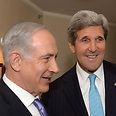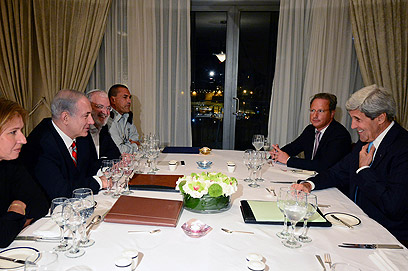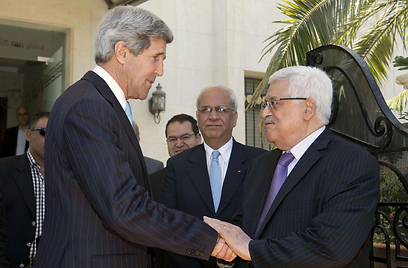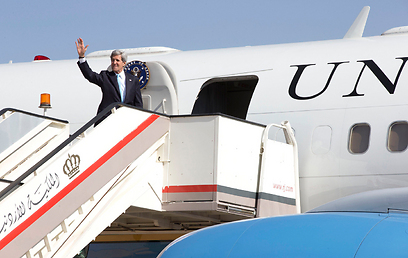
US Secretary John Kerry met with Prime Minister Benjamin Netanyahu Saturday night for the third time during his current visit to the region as part of Washington's efforts to jumpstart the Israeli-Palestinian peace talks. Kerry is expected to hold a press conference in Israel on Sunday to sum up his fifth visit to the Middle East since taking office.
Kerry met for two hours with Palestinian President Mahmoud Abbas in Amman, Jordan on Saturday in what was their second set of discussions in two days.
Related stories:
- Op-ed: Blood near baby's cot
- Jordan: Four-sided peace summit possible
- Kerry: Time is peace process' enemy
Working hard," is all Kerry would say when a reporter asked him before the latest Abbas meeting whether he was making progress.
Kerry, who is on a two-week swing through the Mideast and Asia, has conducted the meetings at a breakneck pace. He even cancelled a stop in Abu Dhabi because of extended discussions on the Mideast peace process.

Kerry-Netanyahu meeting in Jerusalem (Photo: Kobi Gideon, GPO)
He had a four-hour dinner meeting with Netanyahu Thursday night in Jerusalem followed by a more than two-hour lunch with Abbas on Friday in Amman at the home of the Palestinian ambassador to Jordan. Then it was back to Jerusalem for another meeting with Netanyahu and dinner with Israeli President Shimon Peres.
On Saturday morning, he boarded a helicopter to fly back to Amman to meet again with Abbas, this time at the Palestinian president's residence there.
Later Saturday, he was to return to Jerusalem to meet with Netanyahu, Tzipi Livni, Israel's chief negotiator with the Palestinians, and Yitzhak Molcho, a Netanyahu envoy.
Kerry hopes the discussions will yield an outline that would allow the resumption of direct talks between Israel and the Palestinians, and perhaps a meeting between Netanyahu and Abbas. The outline is expected to include, among other things, economic gestures by Israel and a Palestinian commitment to engage in continuous negotiations.
The Palestinians have set three preconditions for the opening of peace talks:
1. The release of Palestinian prisoners.
2. Recognizing the 1967 borders as a baseline for negotiations.
3. Settlement construction freeze.
Netanyahu has clarified that Israel would not agree to any preconditions, and a minister who spoke with the PM said he "wants to renew negotiations, but not at any price."

Kerry (L) and Abbas meet in Amman (Photo: AFP)
An Israeli official said Israel has offered a series of financial gestures to the Palestinian Authority as part of the effort to resume talks.
Another Israeli official said Kerry's current visit "may still be hailed as a great success if talks are resumed, but it may also be considered a failure. The chances are 50-50."
A Palestinian official said the American efforts "have yet to yield a result that could be interpreted as a renewal of talks."

Kerry leaves Jordan en route to Jerusalem (Photo: Reuters)
Intelligence information presented to the Israeli political echelon recently indicated that Abbas is not really interested in direct negotiations, which may force him to make difficult decisions. Rather, the intelligence report said, the Palestinian leader hopes the negotiations would alleviate pressure being exerted by the international community so he could continue advancing unilateral maneuvers in the UN in September.
Kerry is scheduled to leave Jerusalem on Sunday to head to Brunei for a Southeast Asia security conference.
There is deep skepticism that Kerry can get the two sides to agree on a two-state solution, something that has eluded presidents and diplomats for years. But the flurry of meetings has heightened expectations that the two sides can be convinced to at least restart talks, which broke down in 2008.
So far, there have been no public signs that the two sides are narrowing their differences.
In the past, Abbas has said he won't negotiate unless Israel stops building settlements on war-won lands or accepts its 1967 lines - before the capture of the West Bank, Gaza Strip and east Jerusalem in a Mideast war that year - as a starting point for border talks. The Palestinians claim all three areas for their future state.
Netanyahu has rejected the Palestinian demands, saying there should be no pre-conditions for talks.
Abbas made significant progress with Netanyahu's predecessor, Ehud Olmert, in talks in 2007 and 2008, but believes there is little point in negotiating with the current Israeli leader.
Netanyahu has adopted much tougher starting positions than Olmert, refusing to recognize Israel's pre-1967 frontier as a baseline for border talks and saying east Jerusalem, the Palestinians' hoped-for capital, is off the table. Abbas and his aides suspect Netanyahu wants to resume talks for the sake of negotiating and creating a diplomatic shield for Israel, not in order to reach an agreement.
Abbas has much to lose domestically if he drops his demands that Netanyahu either freeze settlement building or recognize the 1967 frontier as a starting point before talks can resume. Netanyahu has rejected both demands. A majority of Palestinians, disappointed after 20 years of fruitless negotiations with Israel, opposes a return to talks on Netanyahu's terms.
- Receive Ynetnews updates
directly to your desktop















